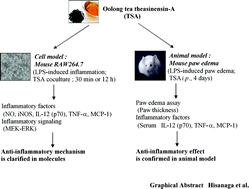Oolong tea theasinensins are a group of tea polyphenols different from green tea catechins and black tea theaflavins, and they are considered as bioactive compounds in Oolong tea. In the present study, based on the properties of theasinensin and information about inflammatory processes, we investigated the anti-inflammatory activity and molecular mechanisms of theasinensin A (TSA) in both cell and animal models. In the cell model, TSA reduced the levels of pro-inflammatory mediators including inducible nitric oxide synthase (iNOS), nitric oxide (NO), interleukin-12 (IL-12) (p70), tumor necrosis factor alpha (TNF-α), and monocyte chemotactic protein-1 (MCP-1) induced by lipopolysaccharide (LPS). Cellular signaling analysis revealed that TSA downregulated MAPK/ERK kinase (MEK)-extracellular signal-regulated kinase (ERK) signaling. Pull-down assay and affinity data revealed that TSA might directly bind to MEK-ERK for the inhibitory action. In the animal model, TSA suppressed the production of IL-12 (p70), TNF-α, and MCP-1 and attenuated mouse paw edema induced by LPS.

